I caught Guan Yu and Zhang Fei on a forest road. It was pure chance: my heir Cao Pi was marching to reinforce my beleaguered armies in the mountains with a freshly raised legion of his own. Unseasoned though my own troops were, I had more of them, but it very nearly didn’t matter. Once our two armies clashed, Zhang Fei waded into my lines and began devastating entire units. The rest of his army was starting to rout but he and a dwindling band of a swordsmen and spearmen were inexorably turning back my right flank as he slaughtered dozens upon dozens of regular infantry. I sent two of my own generals after Zhang Fei, but they were both intercepted by Guan Yu and cut down before they got to him (one was even foolish enough to accept a duel from the man known as the “God of War”). After watching two generals die, Cao Pi wisely decided to hang back.
Eventually, sheer weight of numbers brought both heroes down and pretty much guaranteed that the Kingdom of Shu Han would not advance into my heartland. But Guan Yu and Zhang Fei, now wounded prisoners, would not swear allegiance to me. “Kill me or release me,” was the response of both men and, honestly, I wanted to release them. They were the most incredible fighters I’d yet seen in Total War: Three Kingdoms, but I also knew I never wanted to face them on the battlefield again. So I executed them… and immediately became the most loathed figure in China. The two heroes who were revered by half the leaders in the country. Former friends turned against me over the atrocity, even some of my generals were furious because of old friendships with the two men. By the next autumn there I was beset on all sides. Trying to win one war, I had set in motion two new ones.
You live in suspense when you play Total War: Three Kingdoms. All your friends and allies will one day turn on you, but you never know when. The genius here is that it doesn’t only happen once as everyone enters the final stages of the game, but every time the stakes get higher as the chaotic free-for-all of the late Han period gives way to the Three Kingdoms that give the period its name, and Total War its most satisfying strategy game in a decade. It is, at almost every moment you spend playing it, a game where all hell is about to break loose, or already has—In spite of your plans or often because of them.
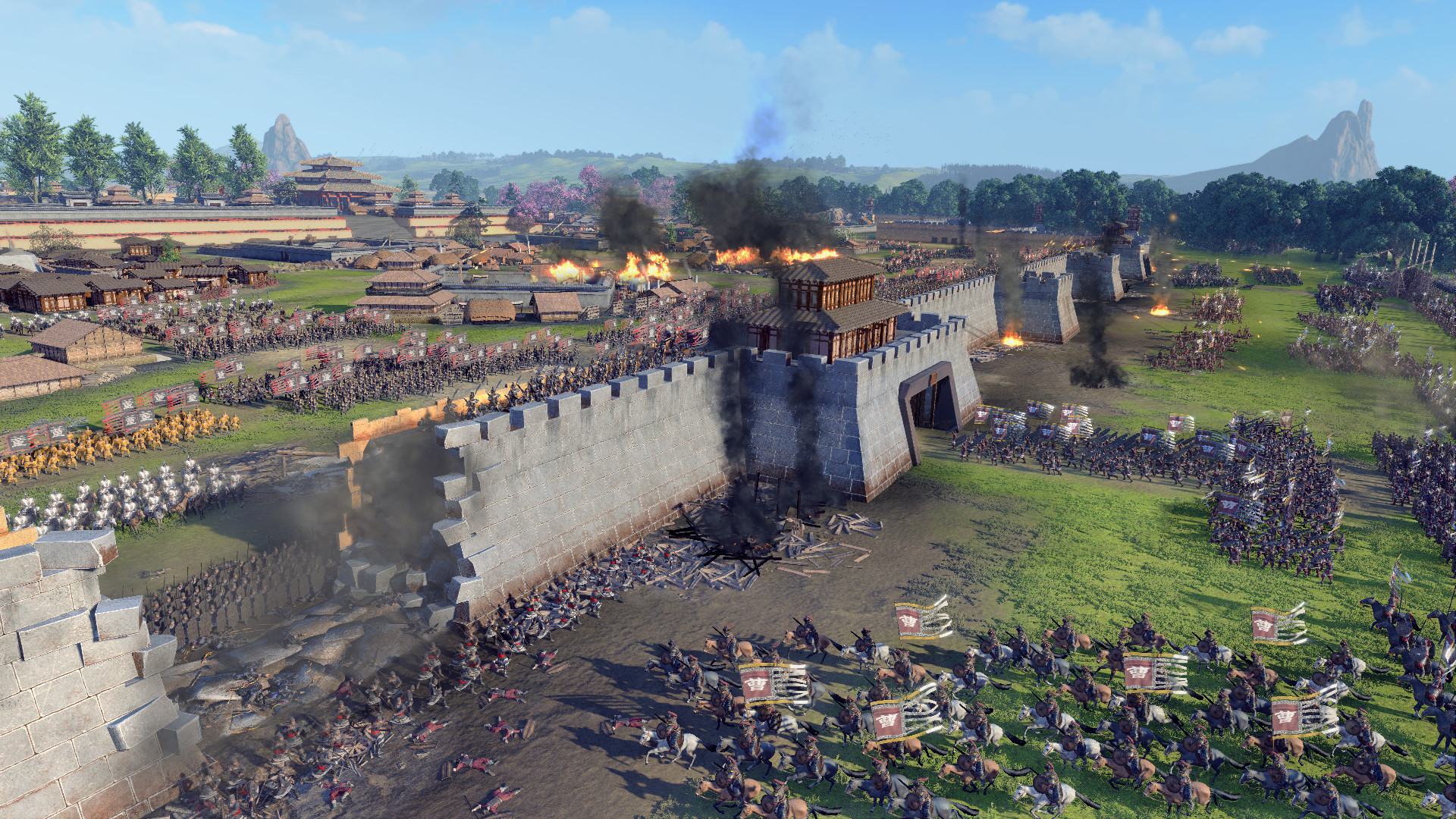
It’s a period most players will know something about, if only because anyone who has played games in the last twenty years has probably encountered Koei’s long-running Dynasty Warriors or Romance of the Three Kingdoms series. It begins late in the second century, as the long reign of the Han Dynasty is coming undone across China, with the empire reeling from the shock of the Yellow Turban revolt and a bloody palace coup by the tyrant Dong Zhuo. You take the part of one of the legendary or infamous leaders who rose in this era who ended up fighting to supplant the Han dynasty with one of their own (a fight many would pass onto children and grandchildren as the Three Kingdoms period stretched deep into the third century).
Which right from the start gives Three Kingdoms an unusual setup. Nobody has openly declared their ambition to become the new emperor, but from small beginnings the campaign turns into a war to re-unify China under a new dynasty.
This is pretty classic stuff for a Total War game, but it’s also the kind of thing that the series has struggled to make hold together over the course of one of its long 25-35 hour single-player campaigns. Taking a small faction from a backwater power to a region-spanning empire often descended into long, wearying grinds against swarms of AI opponents who weren’t so much adversaries as militant speedbumps. They wouldn’t accomplish much in terms of building their own empires, but they would always do their best to derail yours. In recent installments, most notably the excellent Attila and the Total War: Warhammer games, Creative Assembly’s solution has been to add more of an event-driven narrative arc to their campaigns to give them a more satisfying structure, and guarantee a few climactic fights along the way. That wasn’t a bad solution, but it did make those games sometimes feel a bit on-rails for an ostensibly open-ended grand strategy series.
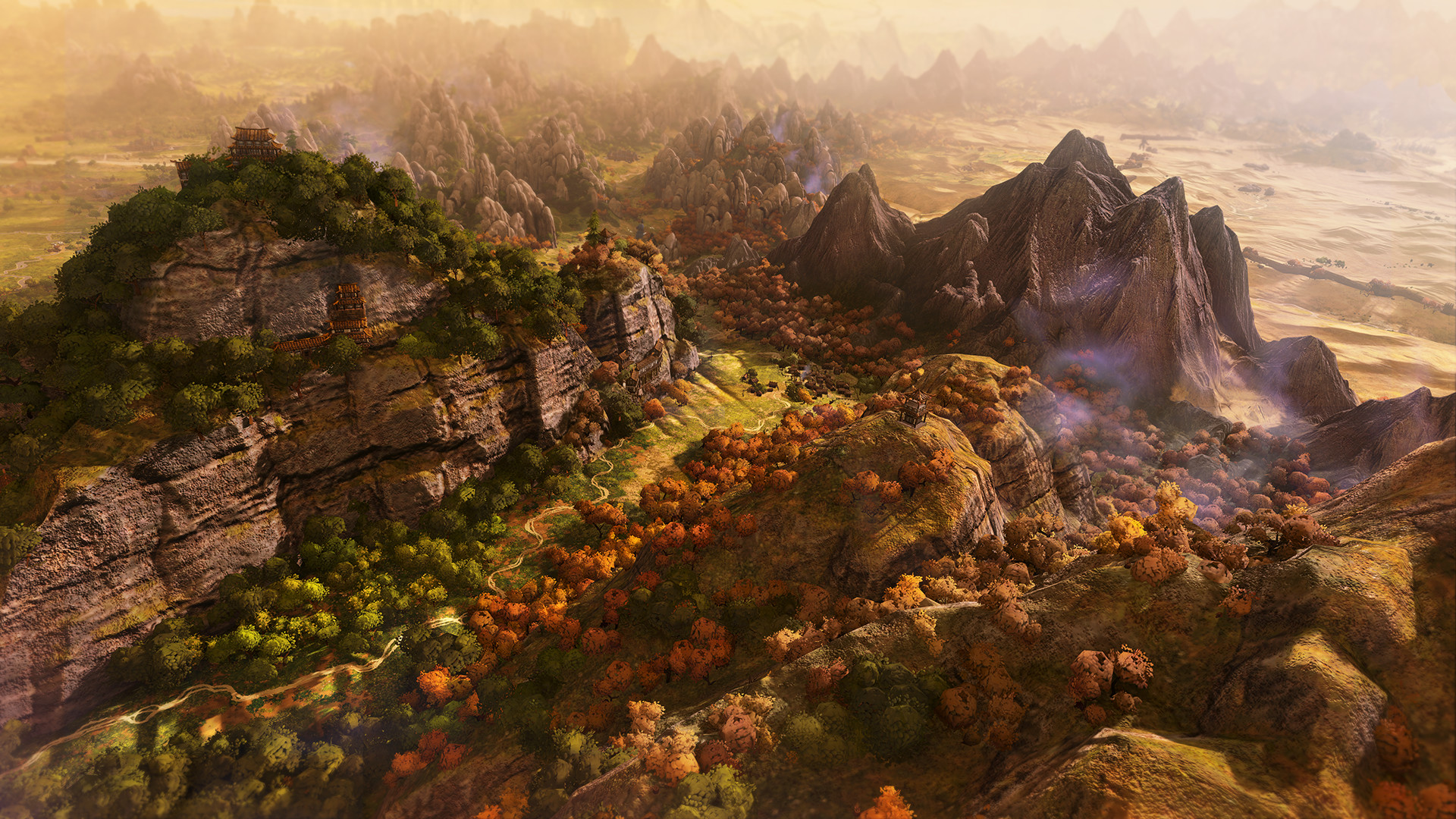
Three Kingdoms feels like the best of both worlds and maybe, in the grand scheme of this series, the best of all worlds. (I’m not ready to commit to that, but as someone who had a love-hate relationship with this series since 2000, I do not make the suggestion lightly.) But rather than seeding each campaign with story events and quests, what gives Three Kingdoms its structure is power. With each step towards the imperial throne, factions grow more isolated, their options fewer.
At the beginning of the campaign, each faction is just a powerful family, and there are so many of them running around that there is tons of flexibility to find new allies, form new coalitions, and diplomatically encircle your enemies. Then some of the families achieve a higher faction rank and the game reclassifies them as more powerful political entities. So one minute you’re just dealing with Liu Bei and his family, and the next minute Liu Bei is now the head of the “Duchy of Shu Han” and then he conquers a bit more territory and suddenly he’s King Liu Bei, and the game identifies his territory and faction as the Kingdom of Shu Han.
It’s inevitable, because Three Kingdoms rarely gives you a choice about whether you want to paint that kind of target on your back. The moment a faction rises to a certain threshold, they are promoted to a higher tier that allows them to field more armies and get some other nice bonuses, but they also suffer massive downturns in their diplomatic relations with other factions. Liu Bei is a one political leader among many, but as the King of Shu Han? He’s viewed as a major threat by everyone else in the game.
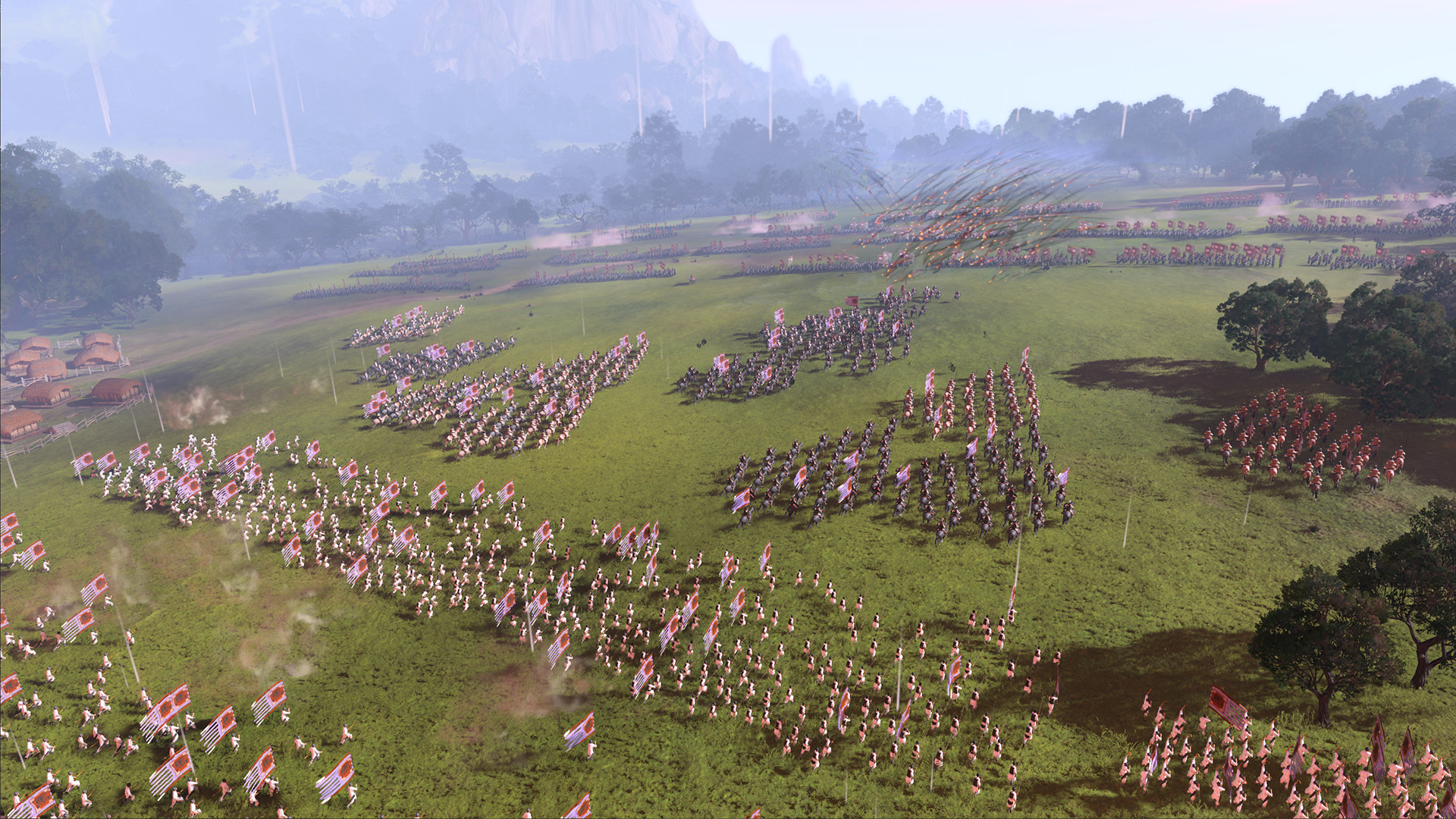
Meanwhile, just to get to this point, a lot of smaller powers have been eliminated from the board. All the noble houses and provincial warlords whose shifting allegiances could rebalance the scales have been wiped-out or subjugated. Deterrence becomes increasingly impossible, the relationships with allies that helped you get to this point inevitably slide toward hostility, and warfare goes from limited to, well, total.
There’s an extra cool twist once someone becomes strong enough to make a credible claim for emperorship: their capital becomes an “imperial seat”, meaning that if someone captures the city and chooses to hold onto it, they are also choosing to proclaim their empire. Even if they’re not exactly ready for the shitstorm their declaration is about to bring down on their heads. Which is what I did when, after thirty some hours, I finally stormed the rich imperial capital of the Song along with all its industry and advanced bureaucracies and decided that actually, I’d be keeping this city for myself. My allies in the war immediately abandoned me and I got notice that to win the game, I’d have to eliminate anyone else who was calling themselves emperor or empress. One of them was Lady Wu, who had taken command of her faction when her husband Sun Jian was killed in a battle, and then ruthlessly seized all remaining Han holdings in southern China. She’d been a close ally since the beginning of the game, her increasingly unstoppable armies had crushed two of my worst adversaries. Now we had to destroy each other, and I was frantically trying to buy-off or bully the remaining second and third-tier powers to keep them on the sidelines while the heavyweights started in on each other.
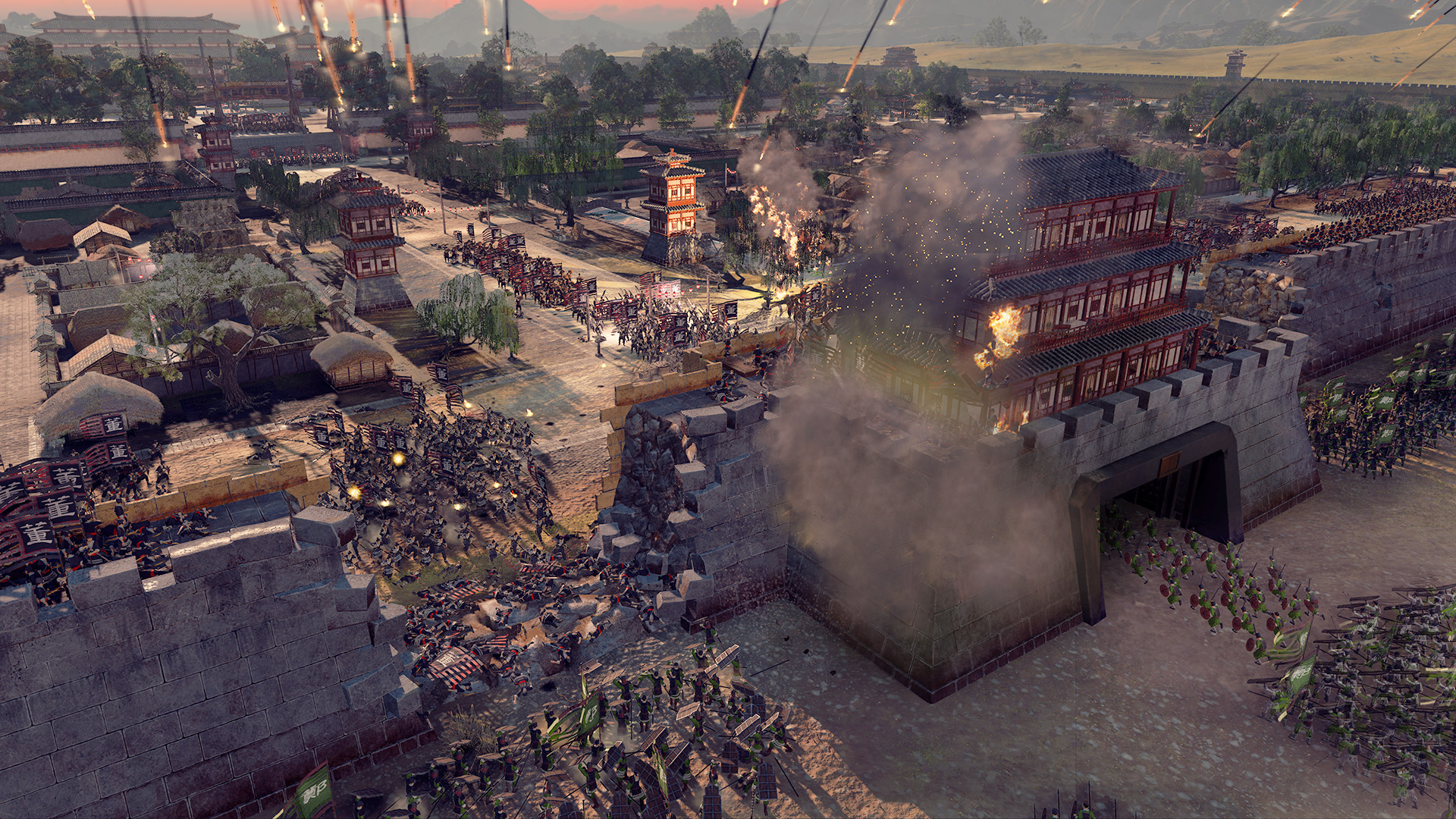
Those duels are largely decided on the battlefield, in classic Total War fashion. The twist here is that Three Kingdoms combines the more realistic unit types and combat dynamics of a historical Total War game with the heightened, heroic scale of Romance of the Three Kingdoms saga. So while you have the familiar rock-paper-scissor battles between masses of infantry and cavalry, there’s a lot of Dynasty Warriors mayhem happening as historical icons like Lu Bu and Xiahou Dun stalk the battlefield and often single-handedly turn the tide. If that sounds too ahistorical to you, you can still play a more grounded version of the game in the so called “Records” mode where generals are not one-warrior armies and the focus is more squarely on unit tactics.
It generates some pretty extraordinary moments as these larger-than-life figures find each other on the battlefield and engage in duels (or don’t accept the offers to duel, in which case the tougher warrior will just try to cut a bloody swath to an enemy general and beat the shit out of them in the mass melee). Troops will stand back while their generals engage in long, dramatic fights with detailed animations and the odd bit of taunting.
Armies take the usual morale hit if a general is killed, like in any other Total War, but also the generals themselves provide heftier bonuses as well as special active and passive buffs that can be crucial to winning a battle. So deciding whether you want to offer or accept a duel involves some careful oddsmaking about who has the toughest commanders on the battlefield. Further, if you kill a faction leader or a major hero in battle, that is a loss that will resonate across the strategic situation as less capable or loyal subordinates are promoted, and charismatic faction leaders are sometimes replaced with failsons.
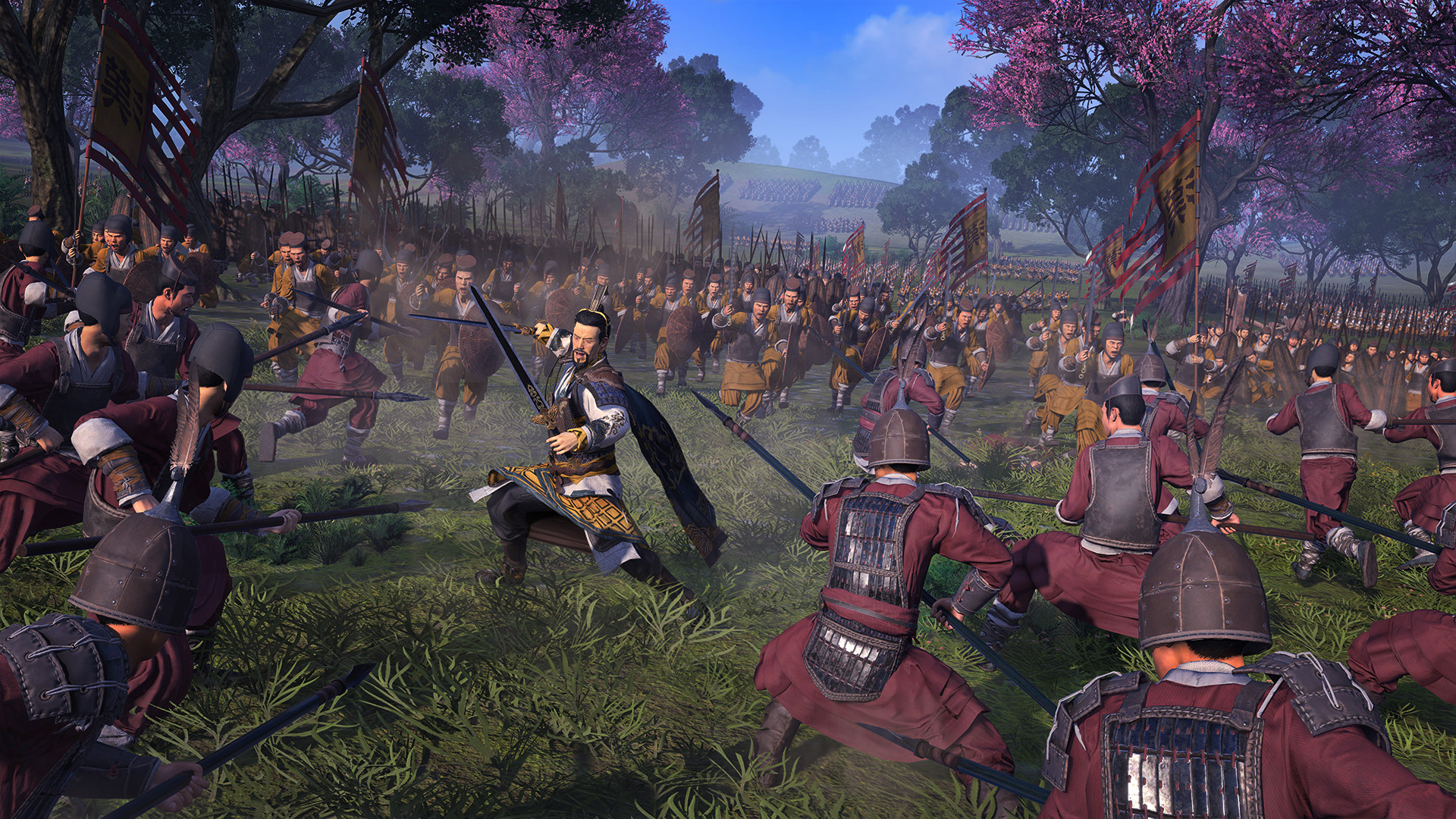
Heroes fall into different classes, however, and they’re not all cut out for the single-combat that the champion class excels at. There are vanguard heroes who are better at just tearing through regular troops like a tornado, like the awesomely terrifying Zhang Fei. There are sturdy sentinels who aren’t particularly strong fighters, but provide tons of support abilities to the troops nearest them and can anchor an entire battle line. There are also “strategists” who, um… let’s say they’re more “ideas” warriors than “war” warriors. They function a bit like casters, and are dead meat if someone comes after them with a spear.
Generals also form the backbone of your army, because all the troops you command on the battlefield belong to the retinues of these generals. Each general has up to six regular units that accompany them in battle, and if you want to replace a general, you are also committing to replacing those units.
Which introduces some cool dynamics via Three Kingdoms’ emphasis on personal relationships. It’s not just a matter of loyalty, as it has been in previous games, but of happiness and team dynamics. The greatest warlord in China might just get under the skin of the greatest general in China, and just working together they increasingly infuriate one another. Let things get bad enough, there might be a real risk of defection, betrayal, or even civil war if a character holds an important administrative position. But if you dismiss a general from your service, or pull them out of an army where they have bad relationships with their comrades, whatever advanced units your recruited for that general are leaving as well. You might also learn that they have been hired by another faction, and you will face them on the battlefield (this features also enables Three Kingdoms’ interesting, but unreliable espionage system).
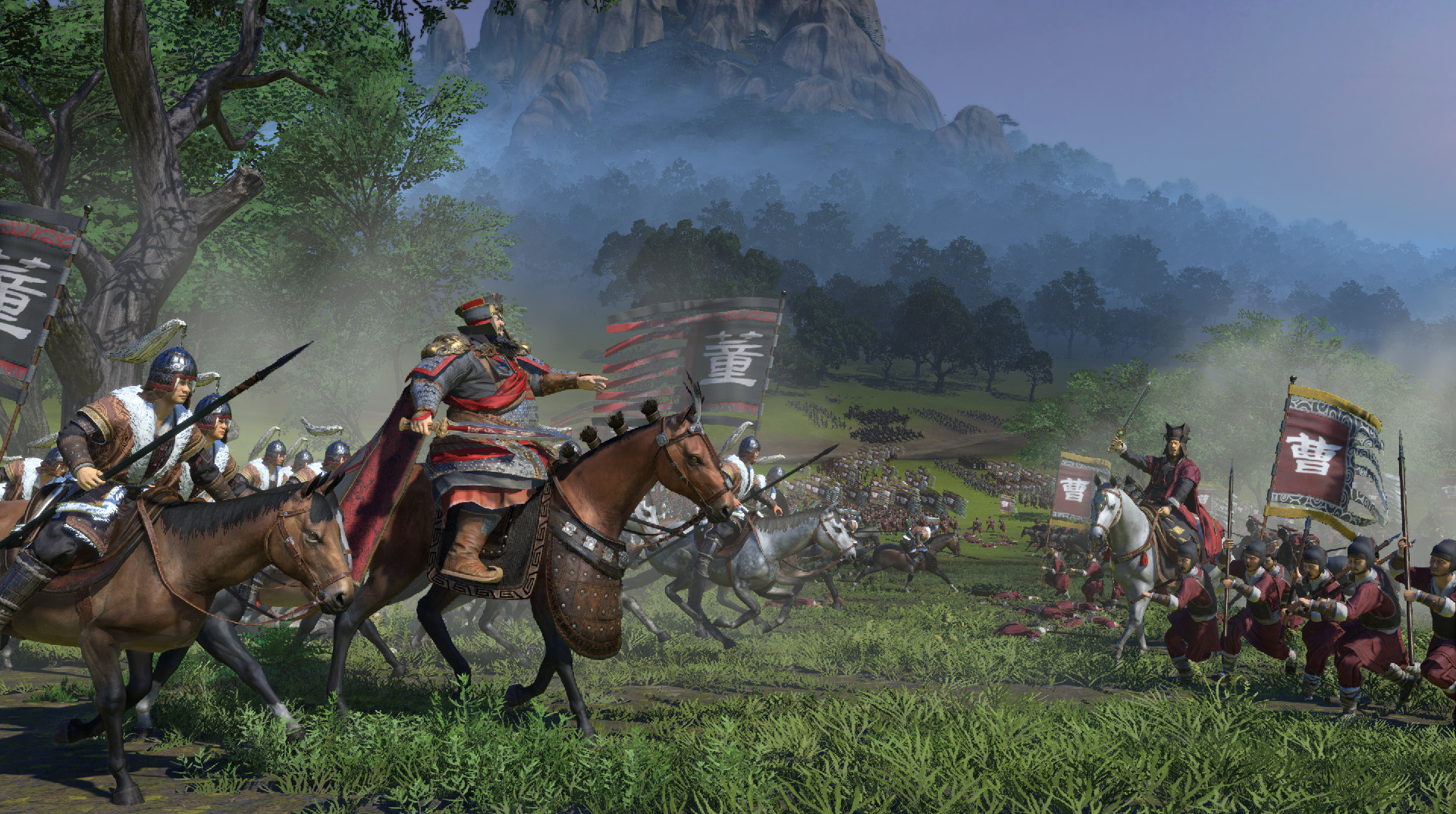
It’s never quite Crusader Kings or Game of Thrones levels of interpersonal drama and backstabbing, and as the scale of the game broadens these individual tensions both seem to matter less and to be defused more easily, but these systems do imbue Three Kingdoms with a sense of inner life for character who might otherwise be little more than stat-sheets and ability lists.
Which is the most consistently surprising and exciting thing about Three Kingdoms. It’s not hard to see how all of this could have gone wrong. Outside the heroes, the armies are not terribly memorable and certainly won’t hold a candle to the personality of the armies in the Warhammer games . The traditional tech-tree has been abstracted out of the game, so now you develop your empire by making an upgrade choice every five turns. The story beats of the more recent Total War games have been set aside. All these choices could have misfired, leaving the game feeling smaller, less dramatic, and with fewer choices than the series has been in years.
Instead, it’s among the best games this series has ever produced. A great strategy game as well as a great tactical showcase that tells and retells stories of treachery, ambition, heroism, and triumph. But they’re your stories now.
420GrowLife
via https://www.aiupnow.com
Rob Zacny, Khareem Sudlow
